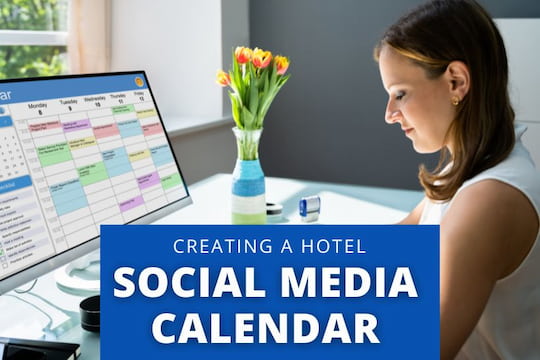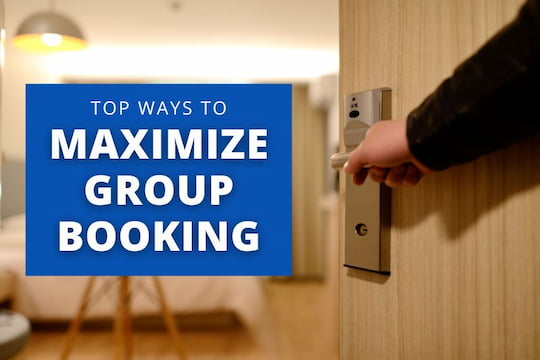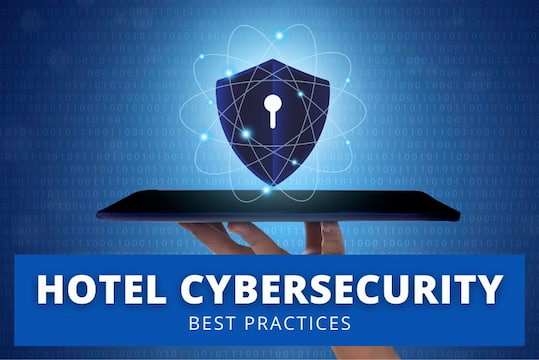When you work in hotel management, you live and die by your reputation. The good reviews will bolster your image and bring you repeat business, while the bad ones can cause corrosive damage.
Guests are more likely to vent about a poor experience than they are to rhapsodize about a great one. And no matter how hard you try, mistakes will be made from time to time. That means you'll have to deal with a few negative reviews throughout your career.
Part of the reputation management for hotels involves responding to the customer reviews, both good and bad. This guide is here to help you navigate these choppy waters.
10 Online Reputation Management Strategies
1. Use Automated Surveys

Some people would never think to leave a guest review unless they were specifically asked to do so. You can prompt them to take action by sending each guest an automated customer feedback survey.
The key word here is "prompt." You're not directly asking for an in-depth review—at least not yet. Instead, feedback surveys are a way to measure how pleased the guests were with their stay. That way, if there was any problem, you can address it before the guests have a chance to leave negative comments on any social media platforms or review sites. If the feedback is positive, you can then encourage them to share their experience with fellow travelers who are looking to book a hotel.
2. Respond in a Timely Fashion
Be sure to respond to reviews within a few days. Studies by TripAdvisor have shown that 65 percent of users would prefer to book a hotel that responds to guest reviews. Therefore, doing so will give you a competitive advantage.
It's critical to leave review responses to the negative comments, because your answer will reveal your regret and your eagerness to correct the issue. But it's also a good idea to respond to the positive reviews. This action demonstrates sincerity and a real knack for hospitality, which is what all travelers are looking for.
3. Make Use of Templates
Form comments—such as "We're so happy you enjoyed your stay. Please consider visiting us again the next time you're in the area"—might be better than nothing, but they feel canned and fake. You want to respond to your guests as a human being, not as a flow chart.
That said, it's time-consuming to craft a personalized response to every comment. You can head this issue off by creating a bank of templates for customer reviews, whether positive or negative.
For a positive review, you don't have to do much more than thank the guest for their kind remarks and stress that they'll always be welcome to return. You can jazz it up a bit with a personal anecdote or inside joke, but the basic framework should remain the same.
Similar rules apply when it comes to a bad review. For these, though, you'll have to run damage control. Make sure your response involves a combination of the following:
- Appreciation for the review
- A clear and concise solution to the complaint
- Professional yet friendly language
- Mention of the fact that the guest would be welcome back at any time
Again, be sure to respond in a timely manner. If you wait too long, the guest will assume that you have better things to do than address the issue. That's exactly the type of thing that can doom a hotel's online reputation.
4. Check Your Social Media Accounts

Social media management and reputation management for hotels are so closely linked in today's digital world that it's difficult to distinguish between them. You can use these blurred lines to your advantage by staying on top of your accounts.
The majority of social media users will discover and purchase services and products without ever putting down their phones. By posting and directly interacting with potential guests, you can boost awareness of your brand and create a more positive guest experience overall.
5. Show Empathy
The guest who leaves a bad review is human, and so are you. That's some excellent common ground on which to build, but you can take it a step further by demonstrating empathy.
Naturally, you're sorry that the guest had a negative experience. It's bad for your hotel's reputation, and that reflects poorly on you. What you need to express in your response is that your regret stems from the guest's discomfort, not its effect on you.
Try building phrases like this into your template: "We fully understand how frustrating this must have been for you. Please let us know if there's anything we can do to help. We're ready to do whatever it takes to rectify this mistake."
6. Use an Online Reputation Management Tool
Did you know you can integrate hotel reputation management software directly into your cloud-based property management system (PMS)? If you haven't already done so, perhaps it's time to join the ranks of the other hoteliers who are benefiting from this tool.
Using an online reputation management tool allows you to automate outreach to your former guests, asking for reviews and general feedback. This will save you the time it would take to reach out to all those repeat guests in person. That way, you'll be increasing the total number of reviews on your hotel website without taking time away from your day-to-day tasks.
That's the key: saving time that you could be spending on guest interaction. When you spend more time improving the guest experience, your hotel's reputation will blossom.
Here are a few other tools you can use to help the review management software benefit your business:
- Mid-stay emails—Check in with current guests to find out how they're enjoying their stay and if there are any potential concerns you can head off.
- Guest profile notes—Whenever a guest mentions a specific issue, you can add it to their customer profile so you'll be prepared the next time they check in.
- Post-stay review requests—Send a follow-up email within 2 days of check-out, asking for guest feedback.
- Data analysis—The system can store, sort, and analyze the feedback your guests provide. Be sure to use only reputable programs for this—there's been a recent increase in cybercrime in hotels, partly involving hacking and identity theft.
7. Reach Out in Advance
Does the user experience begin upon check-in? No—it begins the moment the guest decides to book a stay with you. Often, you can cut off potential issues at the root by sending guests a pre-stay email.
This communication will allow you to gather information about the guest's individual needs, making them feel heard and appreciated before they've even set foot on the property. Be sure to include any relevant information regarding check-in, as first-timers might not know what to expect upon arrival.
You'll also want to spell out the company policies in a friendly and unassuming manner. By ensuring that you've done your part to educate the guests on the rules, you can avoid a lot of potential headaches down the road.
8. Avoid the Urge to Get Defensive
The moment you start to feel anxious or upset when responding to guest reviews, it's time to take a break. If you respond to an irate guest in the heat of the moment, you're bound to say something you'll regret later.
Potential customers are turned off by defensive-sounding responses. It makes it sound as though the host is unwilling to accept responsibility for errors or misunderstandings. The issue in question may not have been your fault, but when you're in management, you need to keep a level head at all times.
Remember that while rude guests are difficult to deal with, it's unseemly to stoop to their level. Your job is to offer hospitality, not teach decorum. When responding to negative reviews, remain calm and professional in your language and tone.
9. Keep an Eye on Google Reviews

Many travelers—especially casual ones—will see your Google listing when they're trying to make a decision about where to book a hotel. In addition to your location and contact information, they'll have access to another useful tool: guest reviews.
Part of your reputation management strategy should involve monitoring your listings and responding to Google reviews as soon as possible. Potential guests will read this feedback and decide on the spot whether your establishment is worth a closer look. Even better: When they visit your hotel website via Google, they're far more likely to book directly with you rather than through a third-party operator.
10. Set Alerts for Incoming Reviews
This ties in with our first tip about responding to reviews as soon as they appear. In order to track guest feedback, you should set up an alert to notify you when a new review is submitted.
Google Alerts is free and simple to use. All you need to do is visit the site and enter your company name, and they'll take care of the rest. Mention.com is another useful tool that offers a free plan. You might also consider using Social Mention to help monitor your social media accounts.
In Closing
Reputation management for hotels is arguably more important than it is for any other type of business. In this digital age, you need to do everything you can to address guest feedback and stay at least one step ahead of the competition. When applied effectively, these online reputation management solutions should help you stay in business for many years to come.
Stay tuned to learn more about our hotel revenue management services.






















